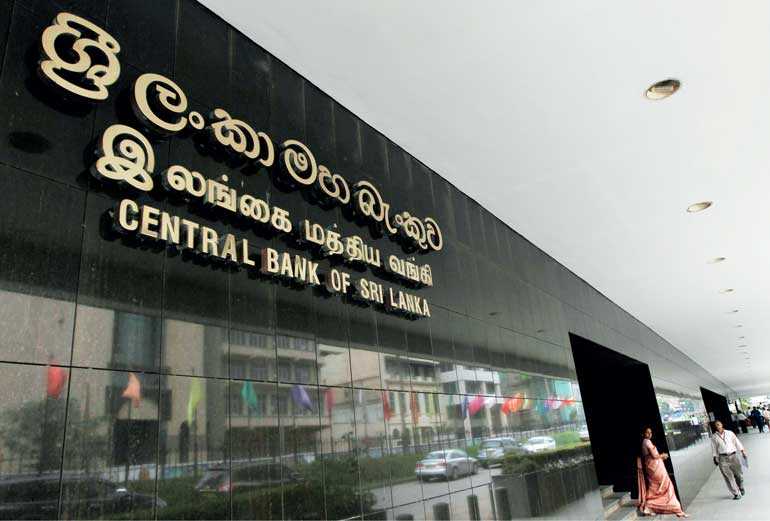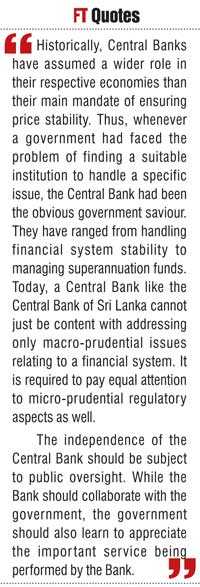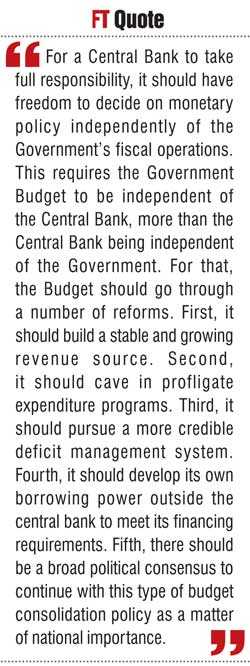Friday Feb 27, 2026
Friday Feb 27, 2026
Monday, 17 September 2018 00:00 - - {{hitsCtrl.values.hits}}

The story so far
In Parts I and II of this series, it was presented that Central Banks, created by society and not by politicians, have the mandate to preserve the value of money which the public holds on trust. The Central Banks could do so by producing money by using a prudent formula. That formula requires them to produce the required quantity of money to facilitate the economy to conduct the growing volume of transactions with the expansion in trade and output.
 If they produce more money than necessary, the excess money, in a small open economy like Sri Lanka, will cause the demand to exceed the supply. Since the supply in the short run is insensitive to the quantity of money, it leads to an increase in the prices causing a decline in the value of money. In addition, in an import-dependent open economy, a part of the increase in money will flow out of the country, generating balance of payments difficulties and eventually putting pressure on the exchange rate to depreciate.
If they produce more money than necessary, the excess money, in a small open economy like Sri Lanka, will cause the demand to exceed the supply. Since the supply in the short run is insensitive to the quantity of money, it leads to an increase in the prices causing a decline in the value of money. In addition, in an import-dependent open economy, a part of the increase in money will flow out of the country, generating balance of payments difficulties and eventually putting pressure on the exchange rate to depreciate.
It is the profligate budgetary policies pursued by Governments that compel Central Banks to produce more money than necessary. In view of this risk, Central Banks throughout the world have been given a degree of independence from the Government. In the case of Sri Lanka’s Central Bank, the Parliament which enacted the Monetary Law Act under which the Central Bank has been established has given independence to the Bank with respect to its policies, budget and key personnel.
However, to exercise this independence, it was pointed out that that those who run the Bank should be nurtured in an independent culture, facilitated by an independent institutional framework. Yet, the recent commentators on Central Banking have pointed out that Central Bankers could be classified under four categories.
First it is the hawks, who believe that the value of money should be protected by not producing money more than necessary. Hence, they seek to protect the independence of Central Banks by saying ‘no’ to governments’ demand for printing excessive money. The second category, called doves, is in the opposite. They believe that money should be printed to support economic growth, and therefore the Central Bank should follow an active money printing policy. The third, called swingers, will vacillate from one view to another, depending on the benefits they could harness by taking a particular stand, hawkish or dovish. The fourth category is ‘pigeons’ who would seek to protect the Central Bank while making peace with the governmental authorities.
Today, we will present the last part of the series.
Central Banks’ wider role: Government oversight needed
Historically, Central Banks have assumed a wider role in their respective economies than their main mandate of ensuring price stability. Thus, whenever a government had faced the problem of finding a suitable institution to handle a specific issue, the Central Bank had been the obvious government saviour. They have ranged from handling financial system stability to managing superannuation funds.
In the case of the Central Bank of Sri Lanka, two co-objectives and many other ancillary functions had been assigned to it from time to time. The co-objectives added to it in an amendment effected to Monetary Law Act in 2002 requires it to attain ‘economic and price stability’ and ‘financial system stability’. The scope of this latter function has been widened considerably after the global financial crisis of 2007-8. Accordingly, when the financial sector is in distress, the Central Bank as its regulator is required to work in close collaboration and consultation with the Government to preserve its stability. Today, a Central Bank like the Central Bank of Sri Lanka cannot just be content with addressing only macro-prudential issues relating to a financial system. It is required to pay equal attention to micro-prudential regulatory aspects as well.
In that game, in the first place, a Central Bank cannot allow banks which are ‘too big’ or ‘too important’ to fail in the market. In the second place, given the current socio-political situation in the country, it cannot allow even banks which are ‘too small’ to fail as well. Rescuing such a failed bank requires the infusion of both liquidity and capital.
Central Banks can provide liquidity through their normal liquidity windows without compromising their price stability objective and entailing long term adverse implications on their role as the regulator of the banking system. However, the provision of capital by a Central Bank for a failed bank has adverse implications for both these functions. It amounts to the Central Bank expanding the monetary base permanently, on the one hand, and getting into playing the role of both the ‘player and referee’ simultaneously, on the other. Hence, that capital should come from the Government.
As Charles Goodhart, member of the Monetary Policy Committee of the Bank of England and formerly an economist at the London School of Economics, had argued in a paper presented to the Bank of International Settlements on the changing role of Central Banks in 2010, “Government insurance of the systemically important parts of our financial systems will remain in place for the foreseeable future. As the ultimate provider of such insurance, governments will want, and need, to maintain a close involvement with the conduct of systemic stability”.
In addition, the other functions of the Central Bank, namely, handling the public debt, managing foreign exchange and operating the payment and settlement, too should receive close government oversight. Increased government oversight means compromising the Central Bank’s independence. But it is unavoidable, given the expanded workload of a Central Bank.

Inflation targeting and Central Bank independence
Today, there is another important development which brings the issue of Central Bank independence to public debate. That is the adoption of a new monetary policy management system called ‘inflation targeting’ by Central Banks. In inflation targeting, as is well known, a Central Bank will take measures to control inflation directly, by announcing publicly a low inflation target for a number of years and stick to it no matter what pressure is brought on it by outside forces.
This is a more credible way of conducting monetary policy, since a Central Bank working under the inflation targeting regime has to take full responsibility for its success or failure. Previously, when the actual inflation rate exceeded the Central Bank’s target range of inflation, there was always space for it to pass the blame on to an outside party such as the Government.
But for a Central Bank to take full responsibility, it should have freedom to decide on monetary policy independently of the Government’s fiscal operations. This requires the Government Budget to be independent of the Central Bank, more than the Central Bank being independent of the Government. For that, the Budget should go through a number of reforms. First, it should build a stable and growing revenue source. Second, it should cave in profligate expenditure programs. Third, it should pursue a more credible deficit management system. Fourth, it should develop its own borrowing power outside the central bank to meet its financing requirements. Fifth, there should be a broad political consensus to continue with this type of budget consolidation policy as a matter of national importance.
The attainment of this last requirement may be difficult, but not impossible. A similar type of budgetary policy was adopted successfully by Singapore’s old guard in late 1960s, as revealed by Goh Keng Swee, the city state’s first Finance Minister, in an article published in 1992. According to Goh, the Singapore’s old guard did not believe that Central Bank credit could bring in prosperity to Singaporeans. Prosperity came through hard work done by them at all levels of society as students, undergraduates or workers.
More recent examples of disciplining the budgets have come from Thailand and the UK. According to the data relating to the annual budget deficits in Thailand, as tracked by the Federal Reserve Bank of St Louis, after the financial crisis of 1997-8, there has been an increase in the budget deficit to 9% of GDP in 1999. But since then, the progressive consolidation of the budget has reduced the deficit gradually converting it to a surplus 1% of GDP by 2003. Since then, the budget has vacillated between surpluses and deficits but remained within a corridor of 3% of GDP. In the UK, despite it being a coalition government, the budget deficit which amounted to 10% GDP in 2010 was progressively and gradually reduced through a tight fiscal program since then. In 2017, it was only 2% of GDP.
Sri Lanka’s move toward a flexible inflation targeting system
The present management of the Central Bank has resolved itself to adopting a flexible inflation targeting system, and is now in the process of converting its policy architecture to facilitate its full implementation shortly. The details of this system have been presented by the Bank in Box Article 01 of its Annual Report for 2016.
This is a policy measure taken by the Bank in the correct direction. It also has received the government’s acceptance as announced in its Vision for 2025. Admitting for the first time that loose fiscal, monetary and exchange rate policies in the past aiming at boosting short-term economic growth without introducing the needed structural adjustments have been the cause of the present economic malaise, the Vision document has pledged to introduce the necessary legislative and operational changes to facilitate the implementation of the flexible inflation targeting system by the Bank.
The necessary legislation requires the enactment of a new Monetary Law Act with restraints for the Bank to monetise the fiscal deficits. In other words, the Government, while making the Budget independent from the Central Bank through fiscal reforms, should grant more operational autonomy to the Bank.

Independence should be followed by accountability
However, independence without accountability will have the adverse repercussion of creating a monster within the sovereign Government of Sri Lanka. That will not be acceptable to either the political authority or to the public. Hence, greater public scrutiny and oversight should be exercised over the work of the Central Bank once it is granted a greater degree of autonomy. There are a number of ways to introduce greater accountability in the work of the Bank.
First, it is necessary to introduce a nomination, screening and selection process for the Governor and the board members, as is being done in the case of the Bank of Canada or the Bank of England. The present method, though it is not a reflection on the incumbent office holders, is marred with the possibility of subjugating themselves to the wishes of the political authorities which have appointed them.
Second, the administration and financial works of the Central Bank should be transparent and fully disclosed to the public. At present, such a disclosure policy has been adopted by Bank of Canada with respect to foreign travel and entertainment by senior officers and board members of the Bank. Third, provisions should be introduced to facilitate the Central Bank management and the board to present and clarify the rationale and objectives of the Bank’s policy measures to special Parliamentary committees that should be supported by experts in the field. This type of public oversight will serve to check on the behaviour of those who run the Central Bank.
Conclusion
In conclusion, it should be recognised that in a sovereign state there cannot be another sovereign institution. Hence, the independence of the Central Bank should be subject to public oversight. While the Bank should collaborate with the government, the government should also learn to appreciate the important service being performed by the Bank.
The political leaders are difficult customers and Central Bank managements would find it difficult to put the rationale of their policies across to them effectively. The solution suggested by the first Sri Lankan Governor of the Central Bank, the late Mr N U Jayawardena, was that the Bank should keep on nagging the Government until it begins to realise and appreciate the Bank’s position. It has also been argued that the relationship between the Government and the Central Bank should be that of a husband and wife.
A good wife will see to it that what husband does is for the overall welfare of the family. However, in my view, the wife should be a smart wife and not merely a good wife. That is because a good wife, having accommodated the demands of the husband may run the risk of being pregnant every year, whereas a smart wife could at least have a gap between pregnancies.
(W A Wijewardena, a former Deputy Governor of the Central Bank of Sri Lanka, could be reached at [email protected] )